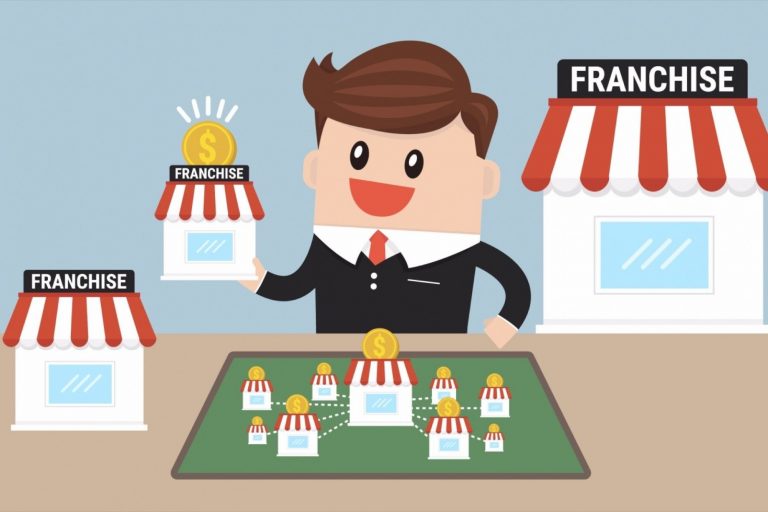Fast Start, Franchise Vocabulary
- Franchise: A legal and commercial relationship between the franchisor (the owner of a business concept) and the franchisee (the person or entity granted the right to operate a business under the franchisor’s brand and system).
- Franchisor: The owner of a business concept, trademarks, and operating systems who grants the right to operate a business under their brand name.
- Franchisee: The individual or entity that is granted the right to operate a business under the franchisor’s brand name and system.
- Franchise Agreement: A legally binding contract that outlines the rights and obligations of the franchisor and franchisee, including fees, territory, intellectual property, training, and support.
- Franchise Fee: The upfront payment made by the franchisee to the franchisor for the right to use the franchise system and brand.
- Royalty Fee: Ongoing payments made by the franchisee to the franchisor based on a percentage of the franchisee’s gross sales or a fixed amount.
- Territory: The designated geographic area where the franchisee has the exclusive or non-exclusive right to operate their franchise.
- Operating Manual: A comprehensive document provided by the franchisor that details the procedures, standards, and guidelines for operating the franchise.
- Training and Support: The assistance and guidance provided by the franchisor to the franchisee in areas such as operations, marketing, training programs, and ongoing support.
- Conversion Franchise: A type of franchise where an existing independent business converts into a franchise, adopting the franchisor’s brand, system, and support.
- Master Franchise: A franchisee who has been granted the rights to develop and sub-franchise within a specified territory.
- Multi-Unit Franchise: A franchisee who operates multiple units or locations of the same franchise brand.
- Area Developer: A franchisee who has been granted the rights to develop and operate multiple units within a specific geographic area.
- Renewal: The process of extending the franchise agreement at the end of its initial term.
- Franchise Disclosure Document (FDD): A legal document provided by the franchisor to prospective franchisees, containing detailed information about the franchise system, fees, obligations, and other relevant information.
- Protected Territory: A specified geographic area where the franchisor agrees not to grant additional franchises that would directly compete with the existing franchisee.
- Brand Standards: The established guidelines and criteria that franchisees must follow to maintain consistency in quality, branding, and customer experience.
- Marketing Fund: A pool of funds contributed by franchisees for joint marketing and advertising efforts to promote the franchise brand.
- Unit-Level Economics: The financial performance and profitability of an individual franchise unit.
- Exit Strategy: The plan or options for a franchisee to sell, transfer, or exit their franchise business.
- Franchisee Support: The ongoing assistance and resources provided by the franchisor to support franchisees in various aspects of their business operations, including training, marketing, and operational guidance.
- Site Selection: The process of identifying and evaluating potential locations for a franchise unit, considering factors such as demographics, foot traffic, competition, and accessibility.
- Franchise Disclosure Document (FDD): A legal document provided by the franchisor to prospective franchisees, containing detailed information about the franchise opportunity, including financial statements, franchisee obligations, history of litigation, and more.
- Conversion Franchise: A type of franchise where an existing independent business converts to a franchise model, leveraging the franchisor’s brand, systems, and support.
- Franchise Expo/Trade Show: Events where franchisors showcase their franchise opportunities and connect with prospective franchisees. These expos provide a platform for franchisors to market their concepts and for prospective franchisees to gather information.
- Area Representative: A franchisee who is granted exclusive rights to a specific geographic area and is responsible for recruiting and supporting individual franchisees within that territory.
- Master Franchise: Also known as a regional developer or sub-franchisor, a master franchisee holds the rights to develop and sublicense franchises within a particular region or country.
- Franchise Renewal: The process of extending the franchise agreement beyond its initial term. Franchise renewals typically involve negotiation and may require the payment of renewal fees.
- Franchise Resale: The sale of an existing franchise unit by a current franchisee to a new owner. Resales allow individuals to enter into an established franchise business.
- Franchise Consultant: An individual or firm that provides guidance, advice, and services to prospective franchisees, helping them navigate the process of selecting and investing in a franchise.
- Franchisee Advisory Council: A group of franchisees elected or appointed to represent the interests and concerns of the franchisee community. They provide feedback, suggestions, and recommendations to the franchisor.
- Territorial Rights: The exclusive or non-exclusive geographic area granted to a franchisee, within which they have the right to operate their franchise and potentially expand with additional units.
- Franchise System: The overall structure and organization of a franchise, including the business model, brand, operations, support, and the relationships between the franchisor and franchisees.
- Turnkey Franchise: A franchise opportunity in which the franchisor provides a complete package, including location selection, construction, equipment, training, and support, allowing the franchisee to start operating with minimal effort.
- Protected Territory: An area designated by the franchisor where no other franchisee within the same system can open a competing unit, ensuring market exclusivity within that defined area.
- Franchisee Fee: Also known as the initial franchise fee, it is the one-time payment made by the franchisee to the franchisor upon signing the franchise agreement. This fee grants the franchisee the right to operate under the franchisor’s brand.
- Protected Territory: A specific geographic area designated by the franchisor in which a franchisee has exclusive rights to operate their franchise unit, ensuring that no other franchisee from the same brand can open within that territory.
- Franchise Disclosure Document (FDD) Review: The process of thoroughly examining the FDD provided by the franchisor to understand the terms and conditions of the franchise agreement, including fees, obligations, restrictions, and other important details.
- Conversion Franchise: A type of franchise where an existing business, often an independent or family-owned business, converts into a franchise by adopting the franchisor’s brand, systems, and operating procedures.
- Franchise Cooperative: A cooperative organization formed by franchisees within a franchise system to collectively address common concerns, negotiate with suppliers, and leverage the collective purchasing power of the group.
- Protected Products or Services: Specific products or services that are exclusively offered by the franchise brand and are not available through other competing franchises or businesses.
- Franchise Operations Manual: A comprehensive document provided by the franchisor to guide franchisees on how to operate their franchise unit, including detailed instructions, procedures, and best practices.
- Master Lease: A lease agreement entered into by the franchisor or master franchisee, allowing them to lease properties and sublease them to individual franchisees within the system.
- In-Store Marketing: Promotional activities and materials used within the franchise unit to attract customers, increase sales, and enhance brand visibility. Examples include signage, displays, and promotional offers.
- Franchise Termination: The process through which the franchisor or franchisee ends the franchise agreement before its scheduled expiration date. Termination can occur due to various reasons, such as non-compliance with the agreement or breach of terms.
- Conversion Support: Assistance provided by the franchisor to franchisees during the conversion of an existing business into a franchise, including guidance on rebranding, system implementation, and training.
- System-wide Standards: Uniform standards and guidelines established by the franchisor to ensure consistency in operations, branding, customer experience, and quality across all franchise units within the system.
- Discovery Day: An event organized by the franchisor to provide an opportunity for prospective franchisees to visit the franchisor’s headquarters, meet key personnel, and learn more about the franchise opportunity.
- Franchisee Satisfaction Survey: An assessment conducted by the franchisor to gauge the satisfaction and feedback of franchisees regarding various aspects of the franchise system, including support, training, marketing, and overall satisfaction.
- Franchise Expo: An exhibition or trade show where franchisors showcase their franchise opportunities and prospective franchisees can gather information, meet representatives, and explore various franchise options.
- Franchise Resale: The process of selling an existing franchise unit to a new owner, allowing the new owner to step into an already established and operating franchise business.
- Area of Dominant Influence (ADI): A geographic region where a franchisor focuses its marketing and advertising efforts to reach a specific target audience and maximize brand awareness.
- Multi-Brand Franchise: A franchisee who operates multiple franchises from different brands or within the same brand family, allowing them to diversify their business portfolio.
- Franchisee Training: The educational programs and resources provided by the franchisor to train franchisees on the specific operational and managerial aspects of running the franchise unit successfully.
- Unit Economics: The financial performance and profitability of an individual franchise unit, including factors such as revenue, expenses, gross margin, and net profit.
- International Franchising: The expansion of a franchise system into foreign countries, allowing franchisees in different countries to operate under the same brand and business model.
- Conversion Support Program: A structured program offered by the franchisor to assist existing independent businesses in converting to the franchise model, providing guidance, resources, and support throughout the transition.
- Co-Branding: The practice of combining two or more brands within the same physical location or business establishment, offering complementary products or services to customers.
- Franchise Advisory Council (FAC): A group of elected or appointed franchisees who serve as representatives to provide feedback, suggestions, and input to the franchisor on various aspects of the franchise system.
- Non-Compete Clause: A provision within the franchise agreement that prohibits the franchisee from operating or being involved in a similar or competing business during and after the term of the franchise agreement.
- Grand Opening: A celebratory event organized by the franchisee to mark the official opening of their franchise unit, often accompanied by promotions, discounts, and marketing initiatives to attract customers.
- Franchise Ranking: Various publications and organizations compile lists and rankings of franchise brands based on criteria such as system size, growth rate, financial performance, and franchisee satisfaction.
- Conversion Fee: A fee paid by an existing business owner to the franchisor when converting their business to a franchise, covering the costs associated with brand integration, training, and support.
- Cooperative Advertising: A cooperative marketing strategy in which both the franchisor and franchisees contribute funds to a shared advertising budget to run joint marketing campaigns and initiatives.
- Franchisee Network: The community of franchisees within a franchise system, providing a platform for sharing experiences, best practices, and support among fellow franchisees.
- Franchise Territory: The specific geographic area within which a franchisee has the exclusive or non-exclusive right to operate their franchise unit, as defined in the franchise agreement.
- Protected Products/Services: Specific products or services that are protected under the franchise agreement, ensuring that only the franchisee has the right to offer them within their designated territory.
- Franchise Marketing Fund: A pool of funds contributed by franchisees for collective marketing and advertising efforts to promote the franchise brand as a whole.
- Master Franchise Agreement: An agreement between a franchisor and a master franchisee that grants the master franchisee the right to develop and sub-franchise within a specified territory.
- Franchise Prototype: A model or example unit that serves as a standard for other franchise locations, showcasing the optimal design, layout, and operational procedures of the franchise.
- Conversion Support Program: A structured program provided by the franchisor to assist independent business owners in converting their businesses into a franchise, providing training, resources, and guidance throughout the process.
- Franchise Renewal: The process through which the franchise agreement is extended beyond its initial term, typically involving negotiation and the payment of renewal fees.
- Area Developer: A franchisee who has been granted the rights to develop and operate multiple franchise units within a specific geographic area.
- Franchise Consultant: An individual or firm that provides expert advice and guidance to individuals interested in franchising, helping them navigate the process of selecting and investing in a franchise.
- Protected Supplier List: A list of approved suppliers from which franchisees must source their products or services to ensure consistency, quality, and adherence to brand standards.
- Conversion Ratio: The percentage of leads or prospects who successfully convert into franchisees, indicating the effectiveness of the franchisor’s recruitment and selection process.
- Franchisee Satisfaction: The level of satisfaction and contentment expressed by franchisees in relation to their experience as part of the franchise system, typically assessed through surveys and feedback mechanisms.
- Franchise Agreement Renewal: The process by which the franchisor and franchisee negotiate and renew the franchise agreement for an additional term.
- Conversion Timeline: The anticipated timeframe for converting an existing independent business into a franchise, including the necessary steps, milestones, and activities involved in the conversion process.
- Franchise Disclosure State: A state or jurisdiction that requires additional disclosures or registration of franchise offerings beyond the standard federal requirements, often involving specific regulations and documentation.
These terms are commonly used in the franchise industry, but it’s important to note that specific franchises may have their own unique vocabulary and terminology.







